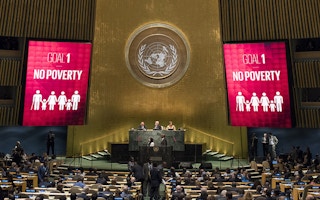In a profoundly volatile world riddled with fractures, the temptation to embrace a seemingly reassuring path of withdrawal or isolation may be strong. In fact, avoidance of potential hazards seems only natural.
For lack of a better alternative, we may be instinctively inclined to look inward in order to circumvent or at least mitigate the risks of a world that feels like end times, in which children are telling us the truth.
Many of us have already decided to follow that route. And yet the fires which recently ravaged the Amazon rainforest are a stark—and tragic—reminder that this line of reasoning, albeit understandable, is misleading. In fact, we should be moving in the opposite direction.
We live in a world in common, which means that we are all vulnerable to threats—be they environmental, social, or political—that know no borders. Because direct or collateral effects can be felt everywhere, we should be nurturing a desire for reconciliation, not isolation.
These opposing views on the many challenges of an interdependent world—climate change, loss of biodiversity, deadly pandemics, social fragmentation, insecurity, trafficking of all kinds, and uncontrolled migration—underpin divergent strategies.
On one hand, proponents of openness and stronger coordinated action seek collaboration with other countries in a spirt of international solidarity.
On the other hand, advocates of distinct national trajectories endorse agendas designed to spread a subtle theory of withdrawal, including at the very center of the fundamentally generous field of development policy.
And the overall trend is unequivocal: an increasing number of leaders, from Russia to Brazil and the US, are unabashedly embracing nationalistic agendas and opposing efforts to promote joint global governance.
“
Because direct or collateral effects can be felt everywhere, we should be nurturing a desire for reconciliation, not isolation.
Consider, for example, the “Journey to Self-Reliance” concept promoted by the United States Agency for International Development. The phrase conveys the positive impression of encouraging countries that receive international assistance to take ownership of their development challenges through enhanced autonomy, as opposed to being dependent on aid.
And USAID deserves credit for breaking with the unrealistic idealism that pervades global development efforts.
Nonetheless, the agency’s self-reliance approach—along with the US government’s aggressive trade policy—essentially accepts and potentially exacerbates existing global fractures. In particular, it promotes inward-looking perspectives, rejects the idea that a collective response to development challenges might be possible (let alone more effective), and justifies aid in the name of US national security rather than international solidarity.
Such an approach cannot be the basis for our development efforts. Development policy should be open and collaborative. It should not be diverted from its raison d’être and stealthily promote isolationism.
But that is the risk facing development policy if it fails to reinvent itself and thus remains a noble yet insufficient instrument of global cohesion.
If an increasingly divided world is to meet the United Nations Sustainable Development Goals by 2030, development policy needs renewed ambition. Otherwise, it will end up helping to make the case for the self-reliance approach.
We therefore need a guiding concept to define a new basis for collective action. I believe that the idea and method of reconciliation can help.
“Reconciliation” is perhaps a simpler and more dynamic way of expressing the collective global objectives reflected in the SDGs. It would amount to a new modus operandi that would help us transcend the simplistic binary division between local and global.
A reconciliation policy would fully mobilise the resources and stakeholders of all countries—including civil-society organisations, multinational companies, major cities, and development banks—and direct them toward concrete cooperation and reciprocal international aid. This would bring about what I call a “polypolar” world.
To implement this policy successfully, we need to revitalize the traditional aid-centered paradigm and promote the concept of “sustainable development investment” (SDI) to guide as much global investment as possible toward fulfilling the SDGs.
SDI would not substitute for official development assistance, but would complement it as a form of investment that ultimately aims to provide public goods, rather than generate short-term financial returns.
To meet these challenges and achieve the SDGs, we must not succumb to the siren song of self-reliance. Instead, let’s embark on a journey of reconciliation. Let’s choose hope.
Rémy Rioux is Chief Executive Officer of the Agence Française de Développement.
Copyright: Project Syndicate, 2019.
www.project-syndicate.org









